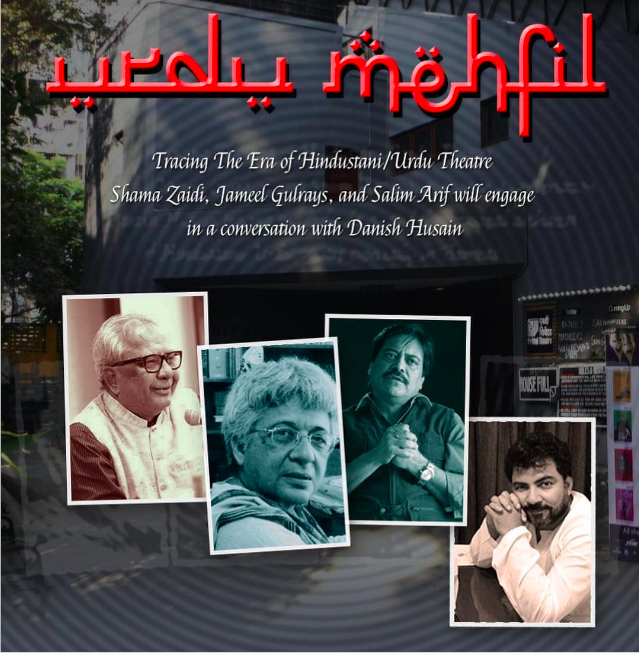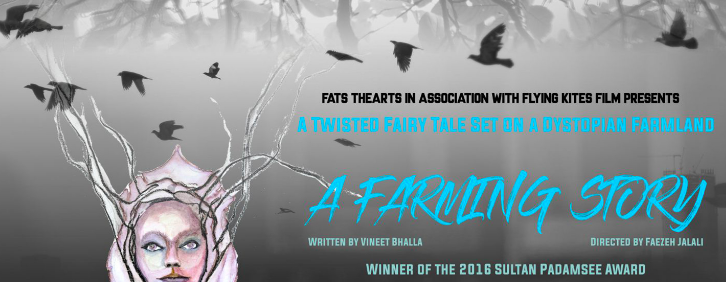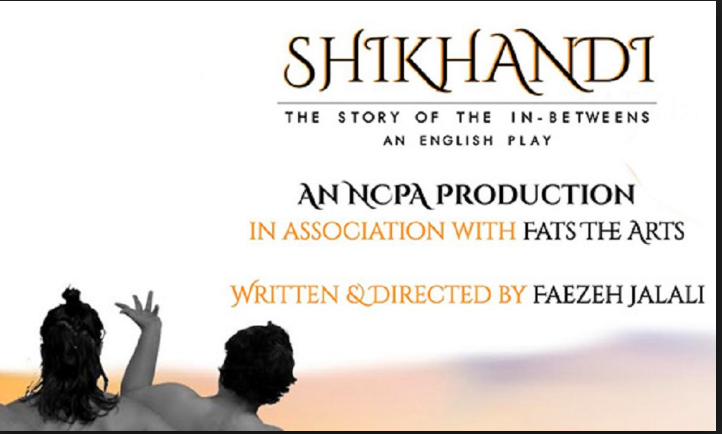2 reviews:'Tracing the Era of Urdu Theatre' by Danish Husain, & 'A Farming Story' by Faezeh Jalali11/13/2018 November 13, 2018 TUESDAY: After solo trekking for a week in Agonda and then travelling 14 hours in an overnight bus to reach Ambernath late afternoon with a nice back ache....... I'd little physical energy to pack my evening to travel again to and fro four hours all the way to Prithvi Theatre, Juhu. How could I've missed two back to back events! Another excitement was in sharing some of my favourite Mumbai artists with my nephew, Savyasachi Anju Prabir, who is currently in town on holidays from his Masters degree on Visual Anthropology, Media and Documentaries course in Munster, Germany. Here is a quick review of the two events from my Culture Call lens. EVENT # 1 Tracing The Era of Hindustani/Urdu Theatre Shama Zaidi, Jameel Gulrays, and Salim Arif in a conversation with Danish Husain tracing the early days, and the principal architects of Hindustani-Urdu theatre with focus on Mumbai. The speakers were not formally introduced. That probably because they are well-known personalities in theatre. Danish Husain of the Hoshruba Repertory began the Urdu Mehfil conversation by first giving the floor to Shama Zaidi - an eminent journalist, theatre and film personality. To summarise, Shama Zaidi emphasised on how Urdu theatre's origin has been influenced by Sanskrit theatre - and in turn influenced modern Indian theatre including in various other countries. Salim Arif gave a better perspective to audience about how Parsi companies found the commercial interest in Urdu language although adopted the architectural set up of the theatre from the West. Interestingly, the Hindustani-Urdu theatre did not limit to Mumbai but travelled across the country through these companies. Jameel Gulrays detailed powerpoint presentation highlighted the influence of Agha Hashar Kashmiri in Urdu-Hindi theatre, in particular Yahudi ki Ladki published around 1915 and later was adopted in Bollywood film, while his first play, Aftab-e-Muhabbat, was published in around 1890s. For an novice like me, I liked his presentation. Danish Husain facilitated the event by highlighting the historical timeline since late 17th century - taking note of influence of trade, space, theatre companies among others - that shaped Urdu theatre in India. This is my first time at Mehfil@Prithvi. My knowledge about Urdu theatre history is next to zero. Its a shame that we'd to leave after an hour to grab a quick snack before the next show. Yet, during my one hour of attendance, I felt that Danish could've moderated the first two speakers' talk - to streamline their thoughts focussed on the topic. The last part of panel discussion and conclusion that I missed makes me curious to learn more about how Urdu-Hindustani theatre personalities have adapted during the British era and the changes that occurred since then... and its impact till now - in writing as well as in performance approach. Such a powerful talk one would expect to draw a huge crowd, but less than a dozen audience in the room makes me wonder whatever happened to Mumbai's interest in such cultural events. So, if you are reading this post do spread the word and join this event every second Tuesday of the months and guess what its in bilingual (English and Hindi) and open to all and for free! Urdu Mehfil is curated by Hoshruba Repertory under the aegis of Prithvi Theatre every second Tuesday of the Month from 7pm onwards at Prithvi House, Janki Kutir, Juhu, Mumbai. EVENT # 2
A Farming Story by Faezeh Jalali Jalali's two previous plays - 07/07/07 and Shikhandi - the story of in-betweens had mesmerised me (see my previous Culture Call posts to read its review). She created a tremendous expectations from her earlier hits. One hour 40 minutes play with a ten minute break, A Farming Story, is an English play written by Vineet Bhalla. A kind of fantasy story about the current state of affairs reflecting on human beings' struggle. As the synopsis reads: A small community of farming Hummals (human animals) is struggling to survive after environmental conditions have resulted in repeated crop failures. The villagers of this community are in debt to the Estate which owns all the land. Into this world arrive Hummal monkeys, fleeing from devastating forest fires. They hope to find refuge in the village. The villagers are deeply divided about this. When a mysterious disease destroys the community's livestock, the Estate blames the monkeys, who are then, imprisoned. What ensues is a fight not only for survival, but also beliefs of compassion, bravery and wisdom.Their world eerily reflects ours, with all-powerful corporations, environmental damage, genetically modified seeds, abject poverty and mass migrations to cities. Here's my take: the actors were fabulous. The use of props and stage is just relevant and beautiful. The hairstyle and vintage props couldn't have been more apt. The fundamental challenge I think is with the script. It looked more of a film script. The first 30 min of the play just dragged and it became a long introduction without music, satire and with too much of dialogues. Some elements were not essential.. for example, the fighting sequence absolutely didn't fit in the play. I was hoping to see the magic of Jalali. It failed, although not completely. Something is missing in this play... One of the female protagonists in a wheel chair brings out an underlying Jalali's signature - gender/women dimension. I didn't find any moment in the play to laugh - though some people in the audience were laughing... it made me wondered what was I missing! With my expertise in forest land tenure and gender expert, 'A Farming Story' sounds like a perfect fit for any International Development organisations' outreach message. In other words, there was too much moral of the story and theatrical dimension got lost in the process. As such I'd recommend you to go watch it for the sake of the social equity issues - combining migration, forest fire, GMO, community land rights etc - that this play raises. Yet, this is not a direct political theatre about staging a revolution. As for theatrical experience this play could've been fit in 45 min. The script is the main culprit. Otherwise, A Farming Story is a relatively nice play even though nothing extraordinary in the storyline. Both the events - UrduMehfil@Prithvi and A Farming Story - reminds me of how theatre in India lost its 'social activism' tag, which used to be prominent in 1970 and gradually disappearing by 2000. Do read this piece 'Staging a revolution: can theatre be an effective form of activism?'.. questioning how the arts effect social change. Post two back to back events in one evening it was nice to get an opportunity to reflect while we both hogged prawn gassi with appam at Mahesh Lunch home restaurant around 11:45 pm in Juhu! That's only possible in Bombay! This post is part of Culture Call www.purabibose.com
1 Comment
Last year I'd the privilege to watch Faezeh Jalali's play 07/07/07 at NCPA's Experimental Theatre. Instantly I became a big fan of Jalali's work. Her unique approach towards social and gender issues creates space for the audience to reflect and feel all sorts of emotions watching her play. I got an opportunity to watch her recent play, Shikhandi - its a story about the in-betweens. Though am not familiar with details of Mahabharata and Ramayana I knew Jalali had a story to tell beyond narrating these epic stories.
Experimental theatre is my one of my favourite theatres - the other being Prithvi theatre - a place I've been frequenting since college days. I was glad to book a front row (AA) because the director was using every space of the theatre balcony, side stairways, used theatrical rigging system (bringing actors to the stage - to create a scene of God comes down to the Earth) and all corners of the theatre. The location of the NCPA is awesome, the cool breeze from Arabian sea and seating on Marine Lines licking Rustom's ice cream after the show (especially in Mumbai's humid summer at 40 degree Celcius) is another attraction. As the play began I couldn't stop laughing and admiring the way contemporary issues and politics in nicely embedded in small doses that is tongue-in-cheek way of creating the story of Shikhandi. Shikhandi is perhaps one of the earliest trans-characters known in mythology - don't ask me about histories - and this character apparently played a key role in winning the battle of Kurukshetra for the Pandavas. Don't get carried away with this mythological stories - and don't get upset if like me you don't know anything about Pandavas or who was Bhima. Director Jalali in a comic and sarcastic way uses her protagonists to explain the characters! I thought it was brilliantly done. She has put together an amazing show using every actors that is both impressive and intellectually provides a teaser to the social issues - be it birth of a girl child, marriage, current socio-political scenario, gender and sexuality and wars or conflicts. I was mesmerized by excellent lighting design and the costume and hairstyle enhances the show with minimalistic yet beautiful. I think the live music added the charm of the play. If you get a chance to see this play, don't miss it! Unfortunately, this play will be relevant even after five decades - though you wish humans begin appreciating equality and gender rights, its a wish after all. |
Privacy Policy: We use Google Analytics to collect data to improve the Website. By using and accessing the website you are consenting to use of Google Analytics. All Rights Reserved.
ARchIvES
March 2019
CATEGORIES
All
Privacy Policy: This website uses Google Analytics to improve the Website. By using and accessing the website you are consenting to use of Google Analytics.
|



 RSS Feed
RSS Feed
